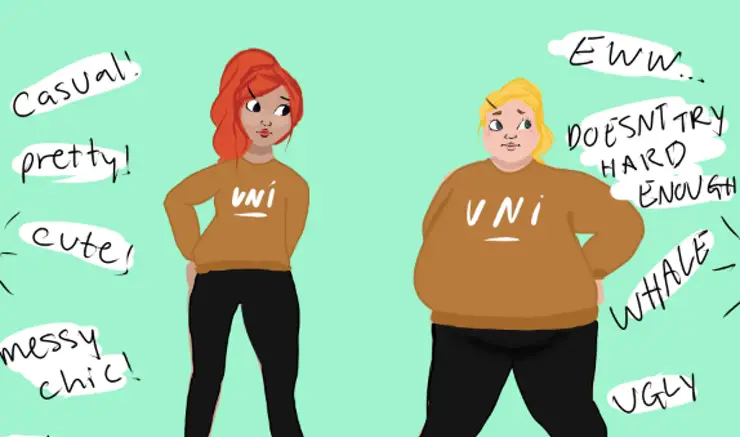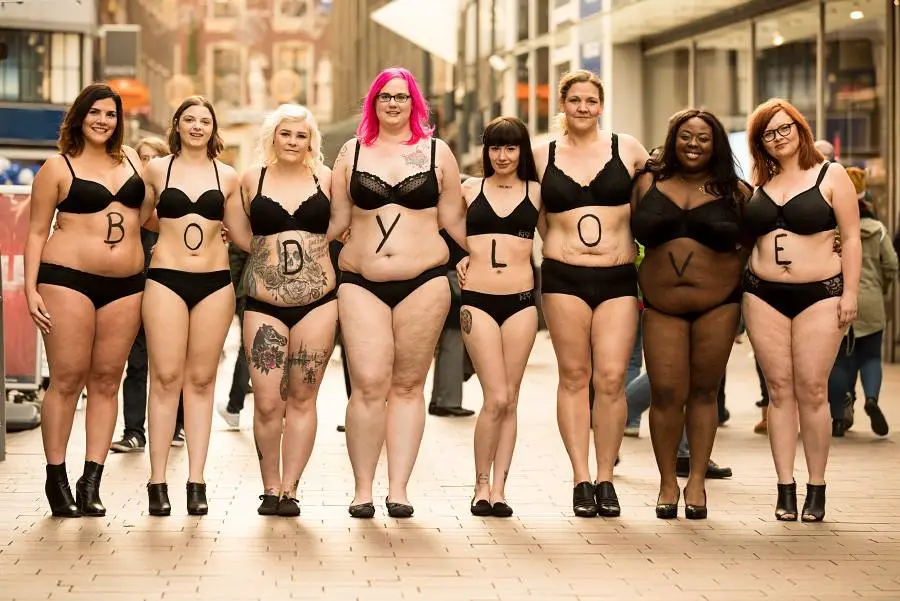The body-positivity movement has gained a lot of momentum in the past couple of years, and women are supposedly feeling more confident in their own skin than ever.
The movement claims to want to stop society from judging women based on the number on the scale, and empower ladies of all shapes and sizes to feel sexy at whatever weight they are. While I agree with this ideology, I feel as though the body-positivity movement has moved to the extreme, and now does just the opposite of empowering women.
As someone who used to have issues with body image, although this was not during the time of the body-positivity movement, I feel as though the movement would have done little to help me get through that rough time in my life. Don’t get me wrong — I don’t completely hate the concept, and do think it has some positive aspects, but I definitely believe that the philosophy has room to improve.
Here’s why.
1. Body Positivity Overlooks Health
When you think of the body positivity movement, what is the first thing that comes to mind? I know for me that it’s pictures of morbidly obese women, standing in their bra and underwear, holding signs that say “Big is beautiful.”

While there’s nothing wrong with this, and some people may find big to be beautiful, it does support an unhealthy lifestyle, as the image for body positivity shouldn’t be obesity. You may be able to feel sexy at any size, but you are definitely not healthy at any size.
If we no longer portray cigarette smoking as cool because we know it causes lung cancer, why are we trying to make obesity look healthy when we know the health risks associated with it? As more than one third of adults and one in five school children are clinically obese, the nation’s weight issue is more than just an illness; it’s an epidemic.
Plus, the body positivity movement is only adding to the problem, not just by making obesity look like the norm, but by demonizing healthy habits as something that society is forcing women to do in order to keep a trim figure. Eating right and exercising is about more than just having a bikini body; it’s about giving your body and yourself what you need in order to be healthy.
I think that a way the body positivity movement could better itself would be to include images of female athletes, or even everyday women of all shapes and sizes, working out, trying to live a healthier lifestyle.
2. The Beauty Industry Will Never Validate You
When I talk to women who are strong supporters of the movement, many of them say that what they would like to see is representation of “real women” in the beauty industry. While I don’t think this is necessarily a bad idea, I think they aren’t realizing that the beauty and fashion industry profits off of women and men’s insecurities. As harsh as that may sound, it’s true.
All you have to do is look around you at the ads in stores, magazines and on TV to see that this is true. Products promising to make you look younger, slimmer or better rested are marketed to Americans everyday. Even beauty and fashion lines that claim to be “body positive” or “support real women” are guilty of this.
If the beauty industry told consumers that they were perfect the way that they were, the whole field would go bottom-up. The moral of this story is not to hate the beauty industry, but to stop looking for validation outside of yourself, and stop comparing yourself to other people. We don’t need to stop having supermodels walk the runway because it makes people feel bad. Stop comparing yourself to supermodels in the first place.
3. Men Are Ignored
Men are constantly told that the only way to look like a man is to be tall (at least six feet) and built like Chris Hemsworth in “Thor.” And for some reason, it’s okay for a woman to criticize a man based on his height (a factor that he can’t control), but it’s taboo for a man to even ask about a woman’s weight. This is just as damaging to men as telling women they need to look like a Victoria’s Secret models: Both are unattainable goals for the average human being.
But I think the worst thing about men being left out of the body-positivity movement is that eating disorders in men often get overlooked. It’s estimated that 10 million men will have an eating disorder at some point in their lives, and mortality rates for men with eating disorders are greater than women with eating disorders.
4. Only Certain Body Types Are Celebrated
Going back to my first point, if the body positivity movement is supposed to be about celebrating the way people look no matter what, how come the only body I see being celebrated is at the far end of the weight spectrum? Where are all the super skinny, muscular, tall and short people?
I have seen too many articles from “body positive” people that claim skinny shaming is okay or doesn’t exist, while fat shaming is equivalent to mocking someone with a mental handicap.
A few years back, I worked as a waitress at a small restaurant in my hometown. One of the girls I worked with was naturally very thin. One day she was waiting on a table, and one of the men at the table told her she needed to eat a hamburger, because the way she looked was disgusting.
Now you tell me — how is telling a girl who’s naturally thin to eat a hamburger any different than telling a fat person to not eat one? If the body positivity movement wants to stay relevant, and truly empower people, they need to start including other body types besides morbidly obese.


















Sophie,
I am from a community where a young woman committed suicide due to the bullying she received from being overweight. There are many reasons why people can’t lose weight and I hope as “someone who has experienced body image issues” in the past you have a fundamental understanding of how emotional trauma can lead to disordered eating.
Skinny shaming and the lack of male inclusion are great issues and I am glad you covered them. I sincerely hope you consider how your perspective comes from a place of judgment and privilege. Perhaps research how bullying affects overweight men and women and you will see why the body image movement is more necessary than ever.
Sophie,
I like that you’re thinking critically about the body positive movement. There are definitely some issues of inclusion. You’re probably right that companies aren’t coming around to making women feel better about themselves anytime soon. The patriarchy sucks, right?!
However, I do urge you to do some more research regarding weight and health. If it’s really about exercising and eating healthy, than the the size of your body shouldn’t matter. Please check out the Health At Every Size Movement and the work of Linda Bacon: https://www.amazon.com/Health-At-Every-Size-Surprising/dp/1935618253
Some other great people who are doing a lot of kick-ass work in this field include Summer Innanen, Christy Harrison, and Virgie Tovar. (https://summerinnanen.com/) (https://www.christyharrison.com/foodpsych/), (http://www.virgietovar.com/blog).
Regarding your issue of inclusion of thin people, short people etc in the body positive movement, Melissa Fabello has written this piece about why thin people are not the focus. Similar to racism, it has a lot do with politics and history of power: http://everydayfeminism.com/2016/07/body-acceptance-not-for-thin-ppl/
Where are you getting your information for this article. There are men in bopo and there are a ton of thin muscular bodies. And actually body positivitu had NOTHING to do with health so why bring that up. You dont even know what body positivity is in the first place so why write this poorly put together article.
I completely agree with this article. I swim, practicing every day for two hours BY MY OWN CHOICE and because I enjoy the sport, not because I feel the need to “look good”. As I work for something I really enjoy, I put a lot of time and energy into this sport. People view working for something you love and being physically fit as being try- hards or trying to shame someone else. I love swimming, and I love being me. I will not stop just because someone says that only “previously unrecognized” bodies are beautiful. Everyone deserves to love themselves and with that being said- this movement has gone way too far.
The vast majority of obese and overweight individuals consume more calories than they burn. Very few of them suffer from a disorder that causes weight gain. Health is the primary concern here – if an individual is obese, they will usually have a shorter lifespan and a lowered quality of life. This is not a judgement call or an insult to the character of obese people. Everything in the life of the fit and trim person is usually better – health, romance, self-esteem and career.
One more thing – people cannot control what they find attractive. The body positivity movement will not succeed in altering our view of obesity. Many will continue to find it repulsive. This is not due to lack of character, or social conditioning. It is a biological response – human beings typically find healthy trim individuals more attractive. Not to be callous, but trying to force males to like obese women is sort of like forcing a toddler to eat broccoli. As you can see, it is having the same result…they protest loudly and run like hell.
Personally I think that the shame surrounding being considered overweight in our society is very similar to any form of oppression. When someone comes from privilege, or a place of power it’s considered acceptable to look down on others and call them names. Everyone has different boundaries I presume, or what they decide to tolerate. I have met so many people who make body shaming remarks about strangers, as if they have the right to judge someone whose shoes they’ve never walked in. As if they have the right to belittle someone because of their size. How about education, and allowing people to make their own choices and to have the freedom to not be defined by society? How about accepting others rather than trying to tell them how to live their lives or tell them they are undesirable because of their size? Being happy, successful, and attractive are not restricted towards a certain body type. Being miserable, unsuccessful, and unattractive are not restricted towards a certain body type either. It really comes down to character, which stems from empathy, openness, and kindness in my book. Who are we to judge someone else when we’ve never walked in their shoes? People are diverse, and we don’t all have to have the same bodies, as I do believe in the old adage; “beauty is in the eye of the beholder.” We should celebrate these differences, rather than stay in the social construct we’ve been conditioned to remain in. Social media should not be used as a weapon to attack other people, and when we put only a certain body type in magazines it is a microaggression towards others who have a different body type than the popularized digitally constructed ideals of beauty. From what I’ve gathered reading about the body positive movement is that they want to have people actually look like they have pores, instead of the digital construction we are so accustomed to viewing on a daily basis. They are trying to find a sense of much needed authenticity. Magazine photos are being challenged, as not just as a form of art for the elite. If you asked someone you are close to, whether they felt beautiful or whether they felt accepted by society, I wonder if their two answers would be the same? It makes sense that the body positive movement has received push back though, we often tend to hold onto oppressive ideas longer than we should before change transpires. Additionally, you have to start to see the media as a form of beauty sickness and as oppressive though and not everyone does. A lot of people aspire to be what they think of as the digitally constructed elite beautiful, and bypass the beauty and authenticity of everyday life. As a side note as well, Season 1, Episode 2, of Black Mirror seems to portray our society very clearly, particularly in terms of body shaming, if no one has seen it yet, it’s really eye opening.
[…] make claims about the damaging results it causes within society. An example of this can be seen in 4 Problems with the Body Positive Movement. This article exhibits the logic behind the movement’s opposition. Many individuals will […]
Here’s a thought what the fuck does it matter what people say about you? Words don’t have power and people don’t have power over you unless you give it to them.
You shouldn’t care if someone describes you as “fat.” It’s a descriptor. People need to learn a out self confidence. It seems a lot of humans don’t know how to deal with stress and need to find outlets. One of the healthiest outlets is movement. Move your body whether you take a walk and breathe or you go to the gym and workout.
Bopo is bogus. Obese women will aren’t attractive to the majority and never will be. If someone can’t even take care of their own body in the most basic way just eating a some what healthy diet with some exercise, their priorities are really messed up, and they aren’t in my book good material to start a family with.
Most people who claim mental health disorders for their weight gain don’t workout. Its really amazing what your body can do, and how much it can adapt if you workout. Working out can hell fix hormone imbalances linked to mood.
America is lazy and fat. Obesity is the #4 largest leading killer I’m the world according Stephen Hawking and its an epidemic.
Stop looking for acceptance from others. Accept and love yourself, and love the potential you have inside of you. Go towards changing yourself to be the best version of yourself physically and mentally everyday.
A journey of a thousand miles begins with a single step. Nothing will get done with people just accepting you, or by you trying to control what others can say or perceive you. That is a zero sum game.
Awesome article, the body positivity movement is disgusting. It is okay to have some fat and it is more than okay to be self confident. However, it is not okay to attempt to pretend that obesity is okay. These body positivity people need to accept that your body tells people a lot about how you are as a person. Someone who is morbidly obese is generally lazier and less disciplined someone half their weight. It is not “oppression” to tell it like it is. If you’re over weight you should change your eating habits and begin to workout. Weight is 80% in the kitchen and 20% in the gym. It’s time for book to stop living in imagination land and start to take accountability for their lifestyles.
[…] studybreaks.com […]